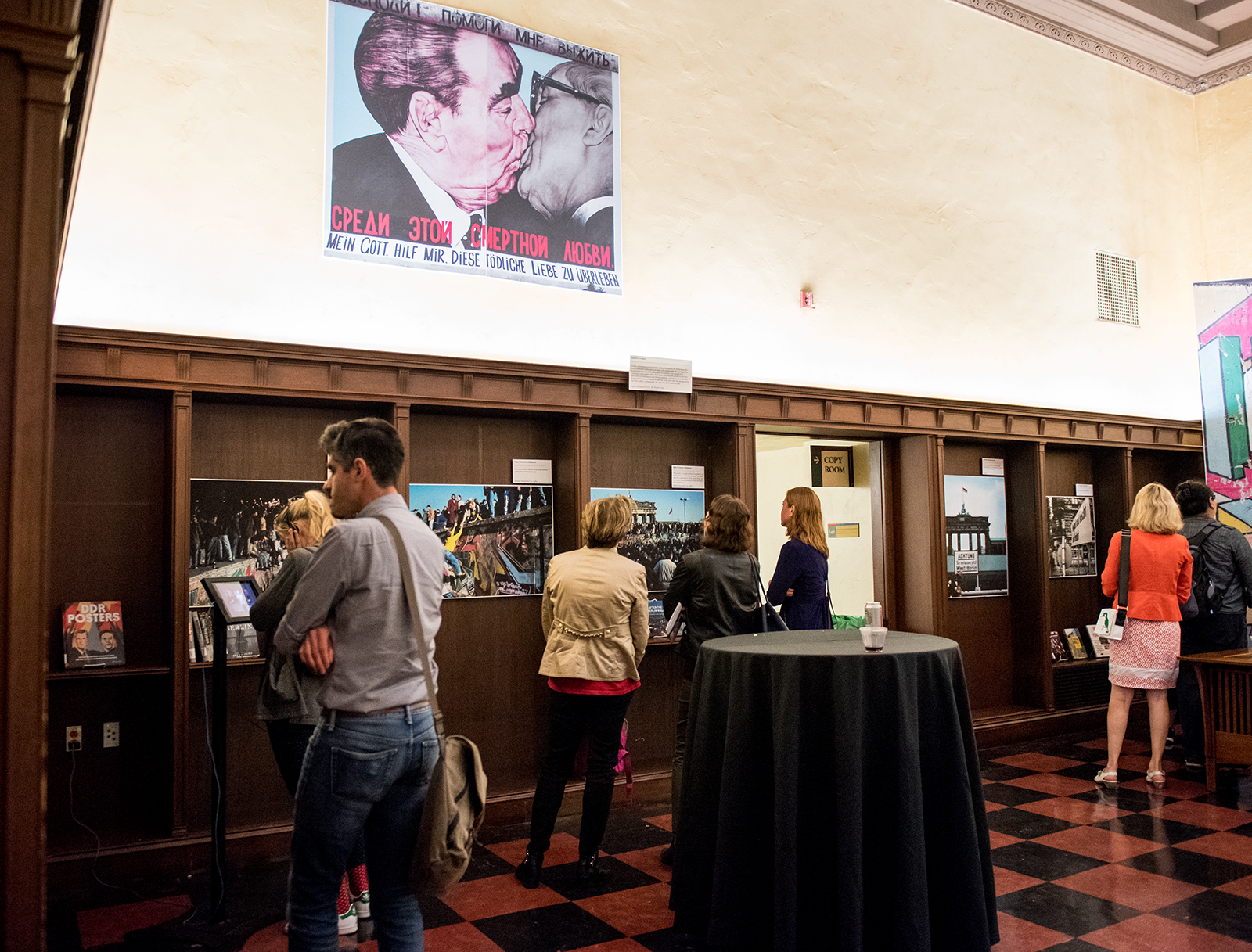Exhibit at Powell Library celebrates 30th anniversary of fall of Berlin Wall

A new exhibit at Powell’s East Rotunda commemorates the 30th anniversary of the fall of the Berlin Wall and independence for Czechoslovakia, now the Czech Republic and the Slovak Republic. (Marilyn Chavez-Martinez/Daily Bruin senior staff)
By Kate Nucci
Nov. 8, 2019 12:24 a.m.
Students visiting Powell Library can now see a full-scale replica of a segment of the Berlin Wall to commemorate the 30th anniversary of its fall.
Powell Library introduced the new exhibition in the East Rotunda on Nov. 7 to celebrate the 30th anniversary of the fall of the Berlin Wall and the independence day for the Slovak Republic and the Czech Republic.
The exhibition opened Thursday with a reception and speeches in Powell. Speakers included diplomatic representatives from the German and Czech consulates in Los Angeles, the exhibit’s curator and the chief curator of The Wende Museum, dedicated to the history of the Cold War.
At the end of World War II, control of West Berlin was divided between the victorious Allied powers. The Soviet Union was given control of East Berlin, and as the Cold War progressed it built a large wall between its territory and West Berlin, a structure which was not torn down until 1989.
“(Czechoslovakia and East Germany) were neighbors. We were two countries that were having the same destiny because you know we saw the West Germans having a better life, and having everything, but we couldn’t have it,” said Alena Aissing, the curator of the exhibit and the UCLA International Institute’s librarian for Slavic, Eastern European and Central Asian studies. “We were blocked.”
Life in the Soviet satellite states was grim, Aissing said. She was born in Czechoslovakia and emigrated illegally in the 1980s.
“(When a family traveled from East to West Berlin), one of the family members had to stay behind because the government was afraid the whole family would not come back,” said Stefan Schneider, Consul General of the Federal Republic of Germany in Los Angeles.
Citizens of the Eastern bloc couldn’t freely read books or listen to music. They couldn’t speak openly out of fear the person they were speaking to was a member of their country’s secret police, Aissing said.
Even food options were limited. Once when she visited her grocery store, she found only potatoes and lemons, Aissing said.
In most circumstances, they weren’t allowed to leave. The wall was fortified with mines and patrolled by dogs, Aissing said.
“The wall was basically just materialization of all the walls (in Europe). … They call it the iron curtain,” Aissing said. “You know, so it was invisible, but if you would cross it, they would kill you.”
Her experiences inspired her to curate the exhibit. She intends to educate viewers about the time in an artistic way, she said.
The exhibit includes a full-scale, 12-foot replica of a segment of the Berlin Wall. It also displays images from the period, books, an audio recording visitors can listen to and a jigsaw puzzle of a map of Berlin as it appeared during the Allied occupation.
Work on the exhibition started in May, when Aissing approached her supervisor about it despite having started her job less than a month before.
“Because it was the 30th anniversary I thought this needs to be done, because when else will it be the 30th anniversary?” Aissing said.
The exhibit was sponsored by the German and Czech consulates in Los Angeles, as well as the LA chapter of the Czechoslovak Society of Arts & Sciences, which provided traditional Czech food and drinks for the event, Aissing said.
It was also sponsored by The Wende Museum, the International Institute at UCLA, the UCLA Center for European and Russian Studies and the Department of Slavic, East European and Eurasian Languages and Cultures, Aissing said.
In a period of significant political polarization, this exhibition is timely, said Joes Segal, chief curator and director of programming at The Wende Museum.
“The people in 1989 were fighting to achieve a measure of liberal democracy … and we are now in danger of losing it all,” Segal said.
The reception was attended by students, visitors and representatives from the German and Czech consulates in LA.
Amy Kalp, a visitor, said she attends Czech-related events such as this to learn more about her roots. Many of her relatives were born in Slovakia, and it made her happy to be around people of her culture, many speaking her language.
“(Events like this help you) understand where you are, where you came from,” Kalp said.
Visitors should take from the exhibit that they need to guard their rights of free speech, free expression and self-education, Aissing said.
“Even now, there are suffering people in many countries in the world,” Aissing said. “And so I think that people here who went to the exhibit, they could ponder their life, and how grateful they should be for what they have here in the United States.”


